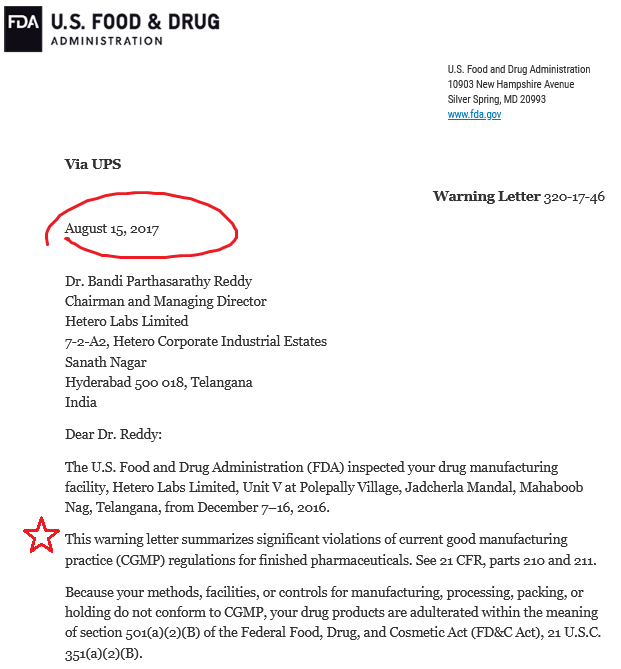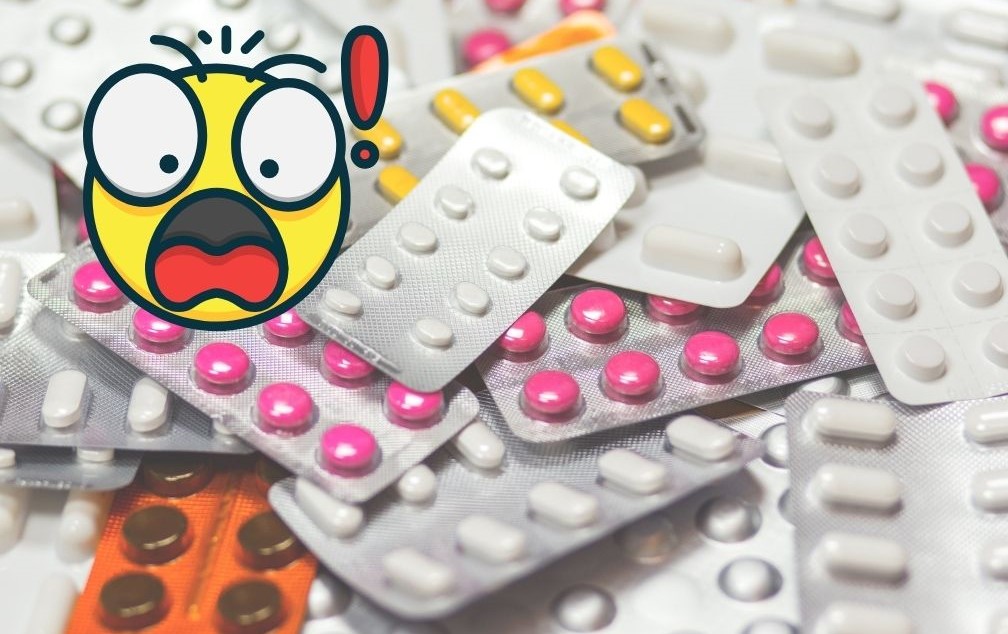The latest example of tainted medicine from an Indian lab can change a person’s DNA and was flagged by the Food and Drug Administration as having a faulty process in making a key ingredient for the blood press medication known as valsartan.
The tainted compound in question was an impurity in azidomethyl-biphenyl-tetrazole (AZBT). It is known to damage DNA, and long-term exposure to an azido impurity in blood press pills can increase cancer risks.
FDA inspectors said that Hetero Labs Ltd in India had a flawed process for controlling these impurities, Bloomberg reported on October 13.
The FDA visited Hetero Labs over 10 days in August, according to Bloomberg. The plant sells key starting materials for valsartan to other pharmaceutical companies to make the finished pill, which then gets shipped to the U.S. Valsartan production can form azido impurities by AZBT, and Hetero ran into a problem with that.
It is unclear if Bloomberg’s mention of “10 days in August” means this August, or August 2017.
This date is important because that is when the FDA sent its first Warning Letter to Hetero following visits of the facility in January.
That letter did not mention blood pressure medication, or valspartan, or any impurities at all. But said that the “firm does not have an adequate ongoing program for monitoring process control to ensure stable manufacturing operations and consistent drug quality.”
Warning Letters are fairly standard. The FDA inspector highlights where the problems are, where the foreign lab is running afoul of the best practices required of U.S. manufacturers and issues their “warning” which says that until the process problems are completely corrected and the FDA confirms that is the case, then the FDA can withhold approval of any new applications to be part of the American drug supply chain.
 Four years later, Hetero was still part of the American drug supply chain.
Four years later, Hetero was still part of the American drug supply chain.
This story is a part of a long pattern. The FDA, with its hands full in the United States, is hard-pressed to properly inspect plants in India and – increasingly – China. Worse yet, most plants that produce key starting materials for drugs are not inspected at all. These are the companies that supply the startup materials Hetero uses, for example. FDA Warning Letters do not frighten off foreign labs, as there is little to no punishment for complying to the fullest.
While this may be because the overseas lab views the FDA’s inspection as too nit-picky and not a violation, there are enough examples out there of companies whose processes for drug making were called out, only to run into problems with tainted drugs sources from those same labs later on.
The FDA is aware of the need to produce more critical drugs here at home.
Last year, they ran a list of hundreds of basic medicines that the U.S. is currently dependent on foreign sources for supply.
The Biden Administration has made reshoring those critical medicines a priority.
The American Rescue Plan dedicated $10 billion in the local pharmaceutical sector, but Biden’s American Jobs Plan, released yesterday, proposes $30 billion over four years to “create U.S. jobs” and make investments “to shore up our nation’s strategic national stockpile.”
Elizabeth Warren (D-MA) and Tina Smith (D-MN) introduced legislation on this in July 2020.
“We need to make sure we’re able to produce the life-saving medicine Americans need here at home, so we don’t have to rely on other countries for the critical drugs we need,” said Senator Smith at the time.
Warren and Smith were a few months behind Congressmen (R-FL-8) and Tim Ryan (D-OH-13) who introduced the Safe Medicine Act in February. They said it was designed “to protect Americans from defective or contaminated foreign pharmaceuticals.”
Congressman Posey and Ryan focused on one drug in particular: heparin.
Heparin is one of the oldest drugs currently still in widespread clinical use as an anticoagulant. It is a natural product made, but a lot of it comes from – get this – Chinese pigs.
In 2008, a Chinese-based pharmaceutical company sold tainted heparin here that resulted in the death of 81 people, with 785 severely injured. Posey and Ryan said that the FDA was worried about shortages at the time so they allowed Chinese-made heparin to continue to enter the country without inspecting it because there were no other supply options.
An alternative method of controlling and regulating heparin, for example, is urgently needed.
Still the President’s words, and two bills ready to go, all of it languishes in gridlock, often held hostage to other pieces of legislation. Meanwhile, people are served up with tainted medication.
Little has changed since the early 2000 heparin crisis.
Americans continue to depend on China, India, and European countries to supply the ingredients needed to manufacture the generic medicines they take each day.
This is especially problematic when it comes to antibiotics, since China now controls roughly 90% of the global supply of inputs needed to make many generic antibiotics, Rosemary Gibson noted in a recent op-ed.
The United States imports nearly 80% of the active pharmaceutical ingredients (APIs), the requisite component of drugs, used in generic drugs. Warren said over a year and a half ago that “overreliance is an alarming national security and public health risk. Foreign manufacturers could restrict or completely cut off the supply of pharmaceutical products during a period of heightened geopolitical tensions or after a natural disaster. Bad actors could tamper with drugs or APIs, rendering them ineffective or even weaponize them.”
Congress should at least move to provide domestic generic drug makers with trade remedies against price gouging and fund long-term contracts for the FDAs critical medicine list for stockpiling.
Major buyers of medication, namely hospital chains, will also have to consider drug safety and supply security when considering who to order from.
On October 14, Fresenius Kabi USA, a healthcare company that specializes in lifesaving medicines and technologies, partnered with generic drug manufacturing Phlow Corp., on essential medicines utilizing advanced manufacturing processes based in the U.S.
Back to the blood pressure medication made by Hetero Labs of India, drug regulators in Canada announced recalls of valsartan back in May due to elevated levels of azido impurities.
Over the next few months, other drugs in the same class, losartan and irbesartan, were also recalled for the same impurities. All of them imports.
Companies implicated include French multinational Sanofi (has a subsidiary in India), Novartis of Switzerland’s generic-drug unit Sandoz (which has a lab in India), as well as Teva Pharmaceutical Industries from Israel.













